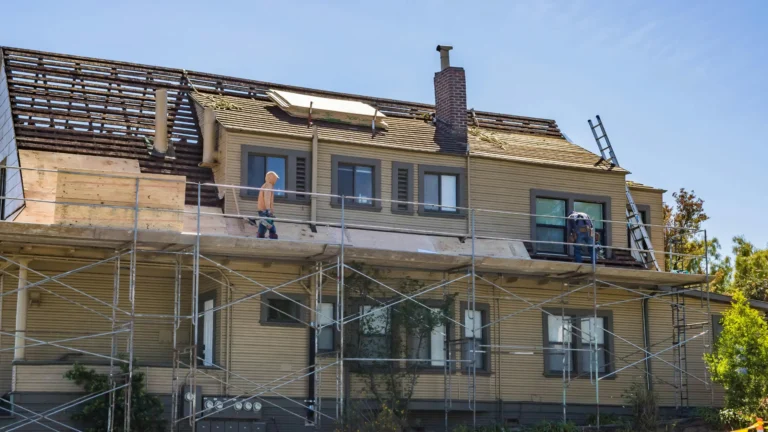Auctions are popular as a simple and straightforward way to sell a house and there are many reasons why sellers choose this route, including:
- Clear and quick timeframes for completion
- More certainty that a buyer won’t pull out
- Being able to sell a property that can’t be sold on the open market
But is selling at auction right for you?
In this guide, we explain exactly how property auctions work and, reveal the key do’s and don’ts and explore the pros and cons of selling at an auction.
How does a house auction work?
Auction sales work in a very different way to selling your home on the open market.
So, it’s important to do your research and know what to expect before you commit to an auction sale.
Auction houses will publish a catalogue of properties, known as ‘lots’, that are coming up for sale a few weeks in advance.
That gives potential buyers the opportunity to scrutinise properties they’re interested in.
If you’re thinking of selling your home at an auction, here’s the process you can expect:
1. Find an auction house
You should always ‘shop around’ for a good estate agent to sell your home and auction houses should be no different.
Look online for reviews of local auction houses and speak to people locally.
Then, get in touch with several to find out more about them, how they’ll market and sell your property and what they charge.
Your auctioneer will get details on the property from the Land Registry, as well as undertaking money laundering checks before they agree to sell it.
They’ll also want to find out more about your property and may visit it to look at its condition and value it.
Questions your auctioneer will ask you
Your chosen auctioneer will want to know more about your property and personal circumstances before agreeing to sell it, including:
- Whether your property is already on the market
- Details of any outstanding mortgage
- Who owns the property
- The property’s condition
- Any legal charges on the property
- How quickly you need to sell
- The property’s value and details of any work you’ve had carried out
If you and the auctioneer are happy, you’ll then agree to the terms of the sale, which includes the date of the auction and how your property will be marketed.
2. Set your guide price
When agreeing to your auctioneer’s terms of sale, you’ll need to set your property’s guide price.
The guide price is what’s displayed in the auction catalogue and on marketing material and is what you, and your auction house, think your property is worth.
When setting your guide price, seek advice from your auctioneer.
While you’ll want to achieve the best possible sale price for your property, you’ll also need to set the guide figure at an amount that will generate plenty of interest.
3. Set your reserve price
The reserve price on your property is the minimum amount you’re willing to sell it for.
This figure isn’t made public and remains between you and your auctioneer, but if bids fall short of this figure, your property will remain unsold.
4. Instruct your solicitor
You’ll need to appoint a conveyancer or solicitor to undertake searches and compile a legal pack, which will be available for buyers to view prior to the auction.
Your auction house may also need your solicitor to be available to answer enquires from potential bidders.
5. Marketing your property
As well as the auction catalogue, your auctioneer should also market your home on the main property portals, like Rightmove and Zoopla, as well as on their own website.
Interested buyers will then have the option to view your property ahead of the auction.
6. The day of the auction
If you decide to attend the auction, you could witness your property being sold first-hand.
If not, the auctioneer will contact you to let you know if your property was sold or if bidding didn’t reach the reserve price.
7. If your property sells
If your property’s reserve price is met, the sale becomes legally binding and contracts are exchanged as soon as the hammer falls.
This means the successful bidder must pay a deposit, which is usually 10% of the sale price, right away.
The buyer must then complete the purchase within a set period, which is often 28 days or risk losing their deposit and any other fees.
8. If your property doesn’t sell
If bidders fail to reach your property’s reserve price, it will remain unsold.
However, bidders can make an offer after the auction but on the same day.
Any post-auction bids will be put to you so you can decide if you wish to proceed.
If you don’t receive any post-auction bids, or your turn down any you do receive, you can relist your property at the next auction for an additional fee or withdraw it.
The Traditional Method of Auction
Most property auctions conducted in an auction house fall under the Traditional Method of Auction.
At a traditional auction, contracts are exchanged between the seller and successful bidder as soon as the hammer falls.
The buyer also pays a deposit immediately and then has a further period to complete the purchase – usually 28 days.
The Modern Method of Auction
The Modern Method of Auction normally applies to online property auctions, where bidders have a set amount of time to submit their best bids before the auction closes.
At a modern auction, the successful bidder doesn’t exchange contracts with the seller right away.
Instead, they pay a non-refundable reservation fee to show their commitment to the sale before exchanging contracts 28 days later.
There’s usually a further 28 days between exchange and completion and this longer process means the bidder has more time to secure finance for the purchase through a mortgage.
What are the pros and cons of selling a house by auction?
Pros and cons of auctioning a house
How much does it cost to sell a house at auction?
Most auctioneers will charge a percentage fee based on the sale price of your property at their auction.
This usually between 1% and 3% plus VAT but can vary.
Other fees you may have to pay your auctioneer include:
1. Marketing fee
Your auctioneer may charge an additional fee to cover the cost of marketing your property to potential bidders.
This fee goes towards production of the auction catalogue, as well as online marketing on portals like Rightmove and Zoopla and organisation of viewings at your property.
2. Entry fee
Many auctioneers charge an upfront fee to cover costs that come with holding a live auction.
Sometimes marketing costs are included within this fee, but always check with your auctioneer.
Other costs of selling at auction
As well as fees and commission for your auctioneer, you’ll also need to factor in other costs that come with selling at auction, including:
- Solicitor fees and legal fees for preparing your property’s legal pack
- A withdrawal fee if you pull out of selling at auction after signing your auctioneer’s terms
- Is it a good idea to sell a house at auction?
Auctions can be a great way to sell your property if you need to move quickly or if you need the certainty that comes with an immediate exchange of contracts.
However, there’s no guarantee you’ll sell your property or achieve the price you want, while the up-front fees for things like legal packs and marketing apply even if your home isn’t sold.
The pros and cons of auctioning a house
Selling your house at auction comes with many pros, but also some disadvantages you’ll need to consider, too:
Pros of selling at auction
- Certainty: When selling at an auction, your buyer must pay their deposit immediately, while also exchanging contracts with you
- No chain: An auction sale means you’ll have no chain and will know the timescales involved
- Competition: By selling at auction, you could find lots of bidders interested in your property and this can sometimes drive up the sale price
Cons of selling at auction
- No guarantee on price or sale: Although you’ll specify a reserve price for your property, you can never be certain of exactly what your property will sell for. If the reserve price isn’t met, your property remains unsold
- You’ll need to move quickly: Auction sales complete within 28 days, so if you’re selling the property you’re living in, you’ll need to move out quickly
- The sale is legally binding: As soon as the hammer falls, your property is sold and if it sells for less than you were hoping for, there’s no going back








